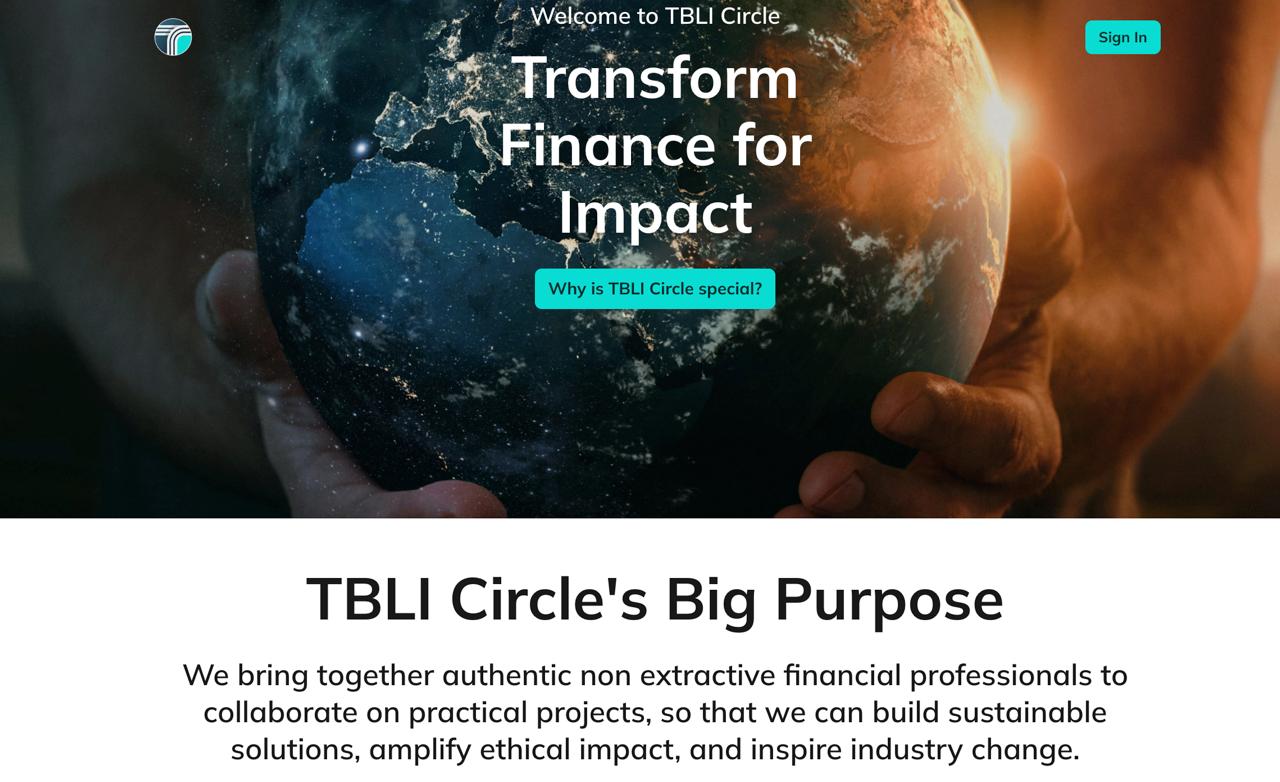 |
|
Author: Sam Rubinstein |
Your weekly guide to Sustainable Investmen |
|
|
|
The Innovation Scam: Why America's Obsession with "Disruption" is Disrupting Our Lives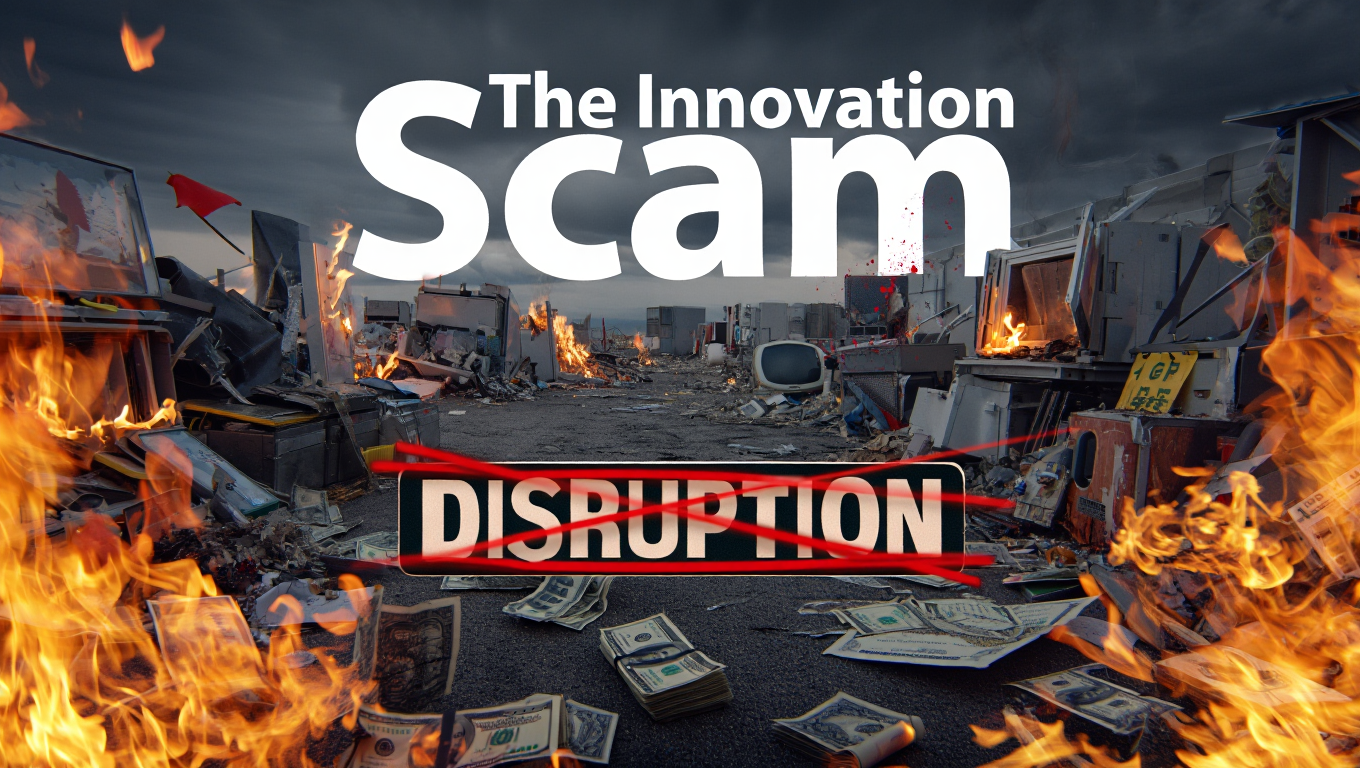 A Radical Truth About What We're Really Innovating For You know what I love about LinkedIn? It's full of people announcing they're "disrupting" industries that were working just fine before some Stanford dropout decided they needed an app and a subscription model. "I'm disrupting the water industry!" No, you're not. You're selling water with a QR code. Calm down. But here's the thing that really gets me: we're living through the greatest innovation boom in human history, and somehow life keeps getting worse for most people. Your phone can translate languages in real-time, but you can't afford to visit the countries where those languages are spoken. Your car can park itself, but you can't afford the insurance to drive it anywhere interesting. Welcome to 21st century America, where we've innovated ourselves into a corner. The Great American Innovation ParadoxWe can put rovers on Mars and develop vaccines in record time, but ask us to ensure everyone has affordable healthcare or housing, and suddenly we become helpless philosophers pondering whether helping people might damage our economic theories. Think about it: we've "disrupted" taxi services so drivers can destroy their personal vehicles for algorithm-determined wages. We've "revolutionized" banking so you can be charged fees for accessing your own money through an app instead of talking to a human. We've "transformed" retail so you can have the privilege of doing the cashier's job yourself while being surveilled by seventeen cameras. This isn't progress. This is regression with better marketing. The Status Anxiety TreadmillWhat's driving this madness? Simple: we've created a culture where your worth is tied to having the newest thing before anyone else. It's not about having nice things—it's about having exclusive experiences that come with compelling origin stories. That's why some tech executive needs his $25 coffee made from beans that have been personally blessed by Tibetan monks and transported by free-range donkeys who've been read bedtime stories. It's not about taste—it's about the narrative. It's about being the person who "discovered" something before it was cool. Meanwhile, the barista serving this liquid miracle can't afford healthcare and lives with three roommates in a converted utility closet. The Innovation Inequality EngineHere's the perverse truth: our technological marvels flow upward while the costs flow downward. The wealthy get personalized medicine; the poor get WebMD. The privileged get smart homes; the struggling get smart landlords using algorithms to maximize rent extraction. We had the technology for remote work for decades, but it took a global pandemic to force the issue. And the minute the emergency passed, the power brokers demanded everyone return to offices because heaven forbid workers gain any lasting control over their lives. What Are We Actually Innovating?Housing crisis? Let's create micro-apartments and co-living spaces instead of addressing why housing became an investment vehicle rather than a basic human need. Healthcare disaster? Let's make wearables that monitor your vitals in real-time but don't actually treat anything when you can't afford a doctor. Climate catastrophe? Let's develop carbon capture technology instead of regulating the industries causing the problem. It's techno-optimism as political anesthesia. As long as we believe some genius in a garage is about to solve everything with the next revolutionary app, we don't have to do the hard work of fixing broken systems. The Cult of DisruptionWe've forgotten a basic truth: not everything needs to be disrupted. Some things work fine as they are. Libraries. Public parks. A cup of coffee that costs two dollars and tastes perfectly good. But "the park bench is perfect as-is and doesn't need blockchain integration" doesn't get venture funding. We've got engineers staying up all night optimizing ad delivery algorithms while bridges collapse and subway systems fail. We've got geniuses designing digital pets while real people ration insulin. The Great ContradictionWe've never had more technological capability to solve problems, yet our most basic problems remain unsolved or are getting worse. We can edit genes and explore Mars, but we can't make housing affordable. We can create virtual worlds, but we can't clean up the actual world. The answer is obvious: our innovation is driven by market incentives, not human needs. The market rewards what's profitable, not what's important. Time for an Innovation RebootWhat if we reclaimed innovation? True innovation isn't just new products—it's better ways to meet human needs. Sometimes that means technology, but often it means social breakthroughs: new systems, new priorities. What if we measured success differently? Instead of GDP growth or unicorn startups, what if we tracked quality of life? Leisure time. Housing security. The revolutionary idea that people should be able to get sick without going bankrupt. What if Silicon Valley decided homelessness was more interesting than virtual reality? The Wisdom of EnoughMaybe what we need is a cultural shift—from valuing the new to valuing the sufficient. From chasing more to embracing enough. Enough house to live comfortably. Enough money to be secure. Enough time to enjoy life. Enough purpose to feel fulfilled. The most radical act in consumer culture? Being satisfied. Nothing terrifies corporations more than someone saying "I have enough." The Choice Before UsWe stand at a crossroads. One path leads to more innovation treadmill that benefits the few while quality of life erodes for the many. The other redirects our creativity toward building a society where everyone can thrive. Maybe it's time to disrupt our obsession with disruption itself. Because right now, we've created a society where your coffee can have a more compelling origin story than most people do. And if that doesn't make you want to innovate something different, I don't know what will.
|
Oil Majors Rethink Green Projects Amid Anti-ESG Push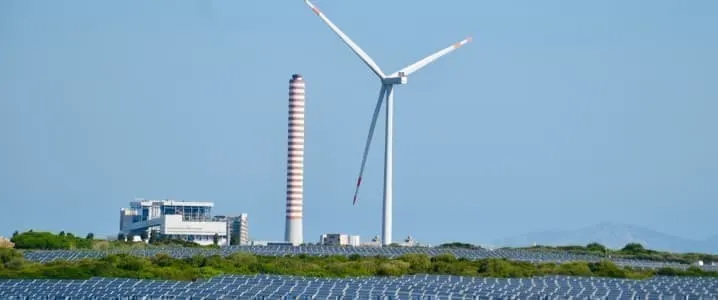 By:Alex Kimani for Oilprice.com Back in 2021, Texas passed two laws that restricted the state from doing business with companies deemed hostile to the fossil fuels and firearm industries. The Lone Star State barred pensions and other state entities from investing in approximately 350 funds that promote environmental, social and governance, aka ESG investing, claiming that ESG investing does not act in the best financial interests of their clients. To wit, the Republican-leaning state banned Wall Street giants Citigroup Inc., BlackRock Inc., Barclays Plc and members of Net Zero Banking Alliance, saying ESG is “…just a hate factory.” The anti-ESG movement has since gained traction, mostly targeting financial services like banks, pension funds and asset managers, as well as the energy sector. And now a new report by GlobalData reveals how the U.S. has become the epicenter of a rising tide of anti-ESG sentiment across the globe. The report points to a Pleiades Strategy tracker that reveals that a total of 370 anti-ESG bills were submitted to the legislatures of 40 U.S. states between 2021 and 2024. GlobalData notes that, whereas few of those bills were signed into law, this does not signify that the anti-ESG movement has weakened. Indeed, an analysis by Ropes & Gray found that anti-ESG bills filed in 2024 enjoyed a significantly higher rate of success than those filed in prior years, indicating that the architects of these bills are becoming more effective at drafting legislative challenges. Not surprisingly, the anti-ESG movement has gained massive momentum since the re-election of Donald Trump as U.S. President. Trump has rolled back many climate action policies by the previous administration, taken aim at DEI policies and passed executive orders banning ESG investing. Trump’s One Big Beautiful Bill (OBBBA) has rolled back many clean energy credits enacted by former President Joe Biden under the Inflation Reduction Act (IRA) of 2022. Whereas OBBBA did not outright cancel the Section 45V clean hydrogen production tax credits as earlier feared, it did accelerate the deadline for projects to begin construction to be eligible for the credit, bringing the deadline forward to December 31, 2027, from January 1, 2033, as originally envisioned in Biden’s Inflation Reduction Act (IRA) of 2022. Trump’s anti-climate actions are similar to his stance in his first term when he unraveled more than 100 climate policies. There are estimates that nearly $28 billion-worth of wind, solar, EV and battery projects have been delayed or cancelled since Trump took office, with a potential 19,000 jobs chopped. “Since President Trump’s re-election in November 2024, the efforts of the anti-ESG movement have ratcheted up, and all companies (not just those in the financial services industry) lie within the movement’s scope,” the GlobalData report states. “Trump has unravelled much of the previous administration’s climate action policies, passed executive orders banning ESG investing and taken aim at DEI policies.” Meanwhile, efforts by the European Union to simplify its regulatory landscape have frequently seen the bloc slide towards anti-ESG, with growing right-wing populism bolstering climate skepticism across the globe. International markets have opposed advancing ESG standards through initiatives like the Sustainable Finance Disclosure Regulation (SFDR) and European Green Deal that enforce sustainability criteria by requiring disclosure of ESG-related risks. GlobalData has predicted that the anti-ESG movement will ultimately impact companies across all industries, including institutions and other entities previously considered to be fully independent. Not surprisingly, Big Oil companies have been scaling back their clean energy investments. Last year, oil and gas giant Exxon Mobil Corp. (NYSE:XOM) announced that it will not move forward with one of the world's largest low-carbon hydrogen projects if the federal government failed to provide tax incentives for natural gas-fed facilities. Current guidelines provide incentives for projects that produce "green" hydrogen by using water and renewable energy, but Exxon wants them extended to"blue" hydrogen from gas by trapping carbon emissions. That’s an interesting take because Exxon CEO Darren Woods previously expressed his doubts about the efficacy of carbon capture at lowering emissions because “…the technology works for high concentration streams of gases but is too expensive for low concentration streams.” BP Inc. (NYSE:BP) has unveiled a less aggressive decarbonization strategy that entails (1) a slower decline in upstream investments and scrapped former plans to shrink refining; (2) focus more on higher-margin hydrogen and biofuels as well as offshore wind; and (3) higher spending in both oil and gas as well as low-carbon. According to the company, the new strategy will offer higher shareholder returns, especially critical to the company after it severed ties with Russia’s Rosneft. BP’s nearly 20% stake in Rosneft helped to add several billion dollars to its bottom line every year. Back in April, BP announced that it was abandoning its hydrogen ambitions in favor of liquefied natural gas (LNG) for transport. Then in July, the European oil major announced that it would exit the $36-billion green hydrogen production facility planned in Australia. BP has informed its Australian Renewable Energy Hub (AREH) partners that it will leave its role as the project’s operator and equity holder. Shell Plc. (NYSE:SHEL) has revealed it had scrapped plans to build a low-carbon hydrogen plant in Norway citing lack of demand. Days later, Norway’s NOC Equinor ASA (NYSE:EQNR) announced similar plans, "We haven't seen the market for blue hydrogen materialize and decided not to progress the project," a Shell spokesperson told Reuters. |
Climate activists gather in New York for ‘Sun Day’ solar energy and anti-billionaire rallies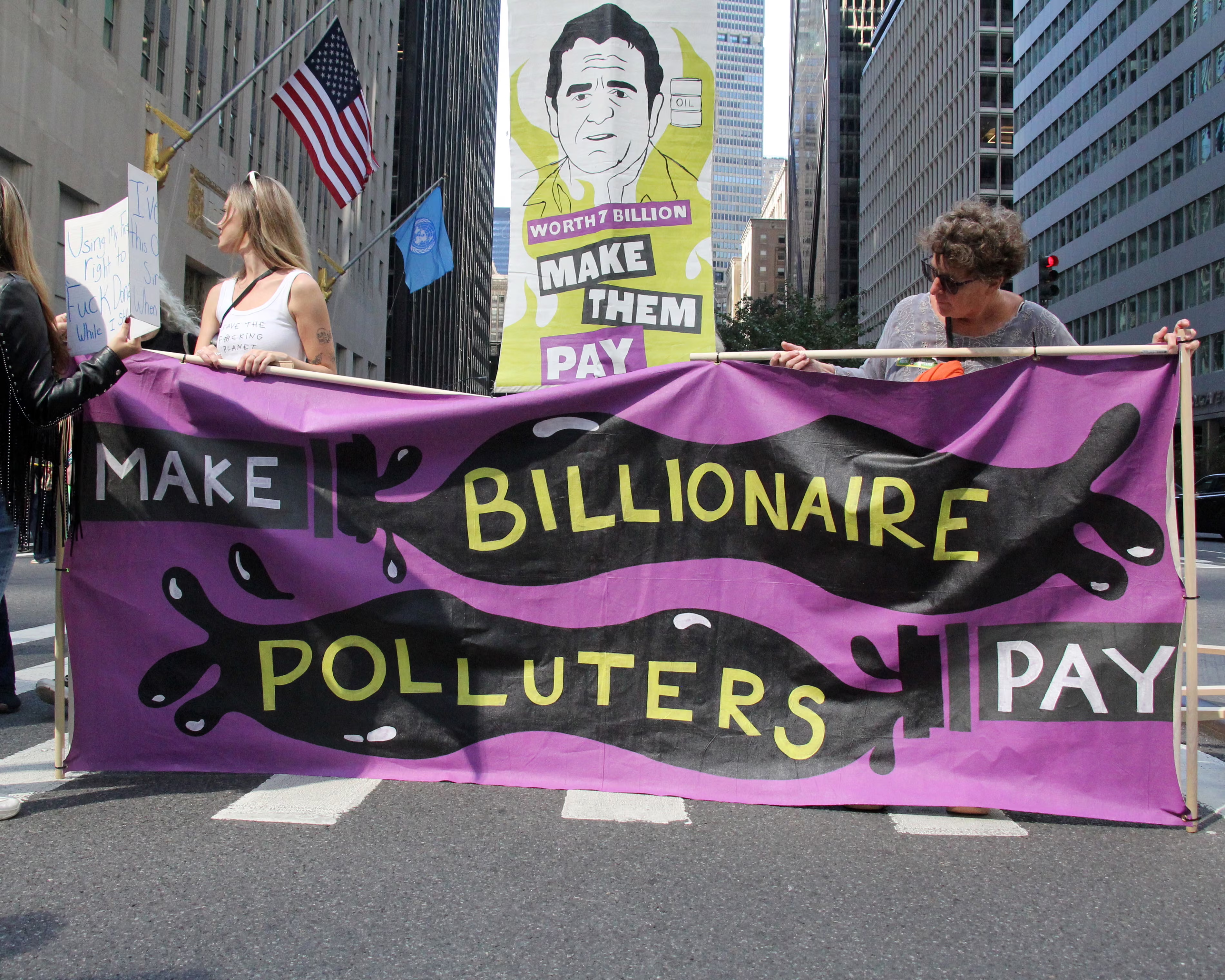 Groups of climate activists walk through the street of New York City for the ‘Make Billionaires Pay’ march on 20 September. Photograph: Emily Cotler/ZUMA Press Wire/Shutterstock By: Dharna Noor The Guardian Sun Day national action supported renewable energy, day after ‘Make Billionaires Pay’ march ahead of Climate Week Hundreds of environmentalists gathered in New York City’s Stuyvesant Square Park and a nearby Quaker meeting house on Sunday to rally in support of solar power and other forms of renewable energy. The event was part of a national “day of action” billed Sun Day, founded by veteran environmental activist Bill McKibben and first Earth Day coordinator Denis Hayes. “It’s so sad to watch the sun going to waste,” McKibben said at a press conference, standing beside environmentalists and their children. “Every single day, energy from heaven going to waste while we drill down to hell for another dose of the stuff that is wrecking this planet.” McKibben was joined at the press conference by other activists, as well as officials from New York and his home state of Vermont. “We have the ability here to protect our children, to protect our future,” said New York’s lieutenant governor, Antonio Delgado. The event in the park followed an all-afternoon celebration of clean power, with displays of solar panels, child-friendly lessons on renewable technology, and panel discussions. One popular panel featured McKibben and New York City’s comptroller, Brad Lander. In other parts of the country, activists held more than 500 other actions meant to highlight the creative ways Americans are ditching fossil-based energy. In Virginia, volunteers climbed rooftops to install solar panels on affordable homes built by Habitat for Humanity. In North Carolina, families gathered at a farm powered by solar panels. And in Michigan, organizers held a car show to show off electric vehicles; families also held a beach clean up nearby. Renewable energy sources have seen unprecedented growth in recent years. Last year, they accounted for over 90% of total energy expansion globally, one analysis found. And the US generated less than half of its energy from fossil fuels for the first time this past March. Yet the day of action came amid unprecedented attacks on climate protections and the renewable energy transition by the Trump administration. Since January, his administration has rolled back grants for solar, kicked off an all-of-government approach to shut down wind, halted and delayed wind projects, and launched more than 150 other anti-environmental and anti-renewable energy actions. The plans are threatening not only the climate but also Americans’ pocketbooks, said Vermont senator Peter Welch. “Clean energy is really good for affordability. It lowers the utility bills people are struggling to pay and creates really good jobs,” Welch said in an interview. “What Trump is doing is wrecking that economic potential. Customers are going to get hammered.” Despite these attacks, the event had an overall air of optimism. McKibben said though the US is backsliding on climate progress, much of the rest of the world is continuing to build out renewable power. “The pattern around the world is unmistakable,” he said in an interview. “The reason that it’s happening is partly because of the climate crisis but also largely because this is the cheapest form of energy, and it’s getting cheaper every year.” The Sun Day action came ahead of Climate Week in New York City, an annual event that convenes government officials, corporate actors and activists for a vast array of climate-focused events. It also came one day after the “Make Billionaires Pay” march, for which 25,000 people took to the streets in New York City. |
‘Something is working’: UN climate chief optimistic about green transitionExclusive: Simon Stiell believes economic benefits will compel countries to speed up climate action 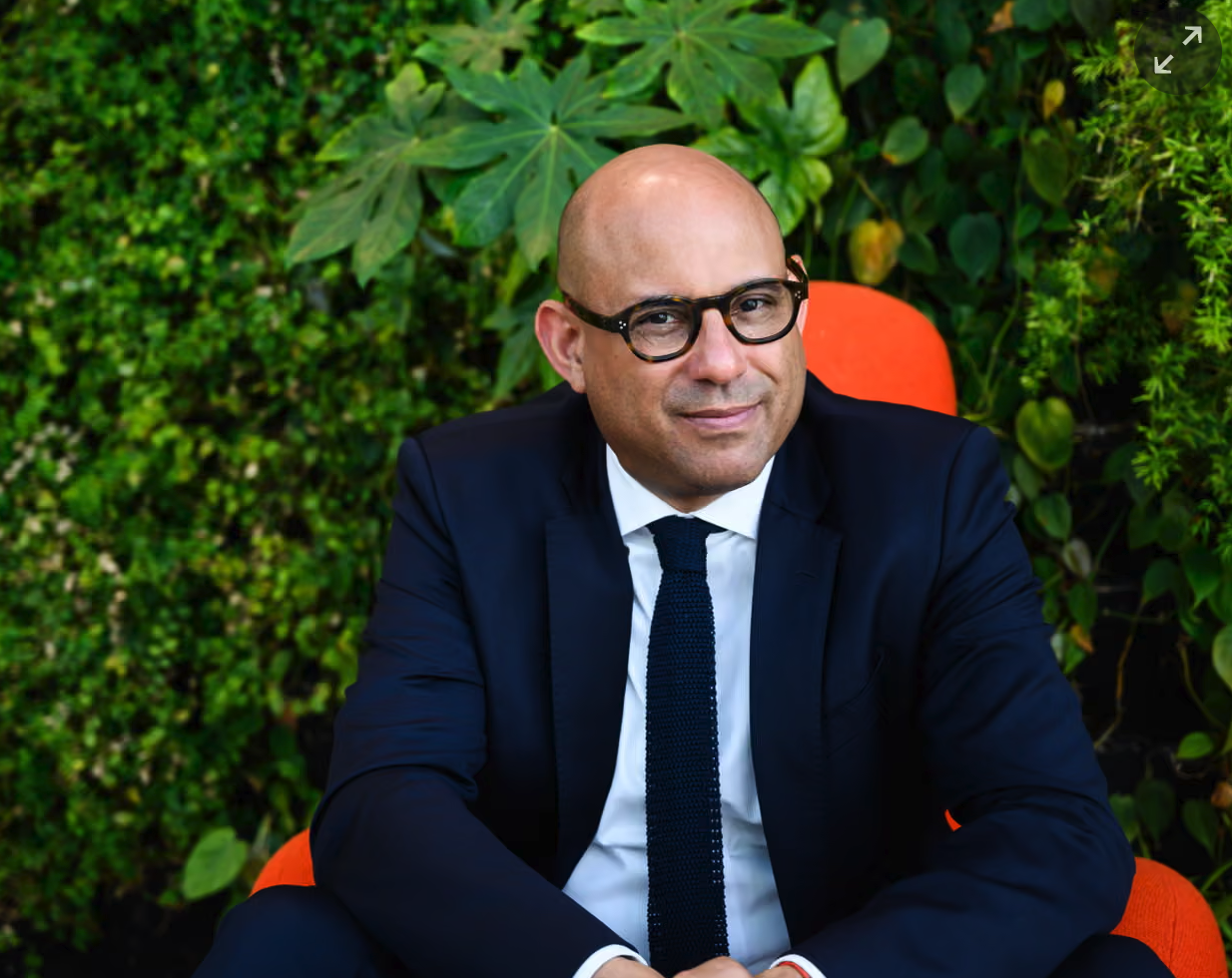 Simon Stiell: ‘I see promise, I see action. I see tangible output. But not enough.’ Photograph: Bernd Arnold/The Guardian Fiona Harvey Environment editor
Cleaning up industry and the global economy will produce massive economic dividends for countries that grasp the opportunity – as the example of China has shown, the UN climate chief has said, before a crunch summit of world leaders this week. In a last-ditch call to heads of government summoned to New York by the UN secretary general this week, Simon Stiell, the executive secretary of the UN framework convention on climate change, said governments would almost certainly fail to come up with the climate commitments needed to fulfil the Paris agreement before a deadline this month, but they could still reset their economies to reap the advantages of low-carbon growth. “We’re moving in the right direction,” he said. “Not fast enough, not deep enough, but [the progress countries have made on moving to a low-carbon economy] is showing that something is working. We need to find all the levers that are available to us, to see how we can accelerate further.” On Wednesday, on the sidelines of the UN general assembly, Stiell and the UN secretary general, António Guterres, will make a final plea to world leaders – excluding Donald Trump, who is snubbing the meeting – to present national plans on the climate, before the Cop30 climate summit in Brazil in November. These plans – known as nationally determined contributions (NDCs) – are required under the Paris agreement, to set out how countries will limit global temperature rises to 1.5C above preindustrial levels, beyond which the impacts of the climate crisis become catastrophic and irreversible. The deadline for the plans, which cover the next crucial decade of greenhouse gas emissions, was meant to be February this year, but in the midst of Trump taking office and global political upheaval, Stiell extended it to the end of this month. At that point, the UN will assess the NDCs and judge whether they fulfil the Paris aims. Stiell knows the NDCs will fall short of the 1.5C target, as many countries are likely to present inadequate responses. These include the US, Russia and Saudi Arabia, all of which have sought to disrupt recent climate talks. But there are also significant concerns over the plans of other big emitters, such as China and the EU, which outwardly profess commitment to the climate. |



.jpg)
